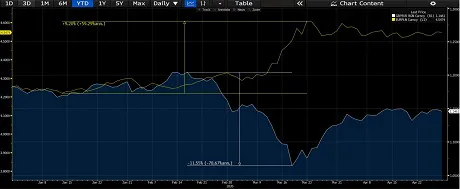One thing is sure, even in these corona times - people must eat. The European fruit and vegetable trading sector, therefore, fortunately, continues. But much of that trade comes from and goes overseas. What of business involving other currencies than the Euro? Do payments continue as is or have specific situations arisen due to these uncertain times?
“Our clients mainly deal with the British Pound, Polish Złoty, and American Dollar,” says Camille Faber, Ebury Netherlands’ Head of Dealing. This company focuses on offering currency services, among other things. “The Złoty and Pound, in particular, have fallen victim to value development differences in the wake of the corona crisis.”

Camille Faber, Ebury Netherlands’ Head of Dealing
Risky investment
Camille says the Złoty devalued by 9,2% against the Euro during the crisis. “In these markets, often more than merely profit margins are used. Not taking out insurance against currency movements can be either a big advantage or a big disadvantage.” A part of a product’s cultivation or processing usually takes place in Poland. Złotys are, therefore, often bought to meet financial obligations in Poland. That means fewer Euros now have to be spent for the same amount in Złoty. That benefits this group.”
“It is less beneficial for trade to Poland, where payment is made in Złoty. Fewer Euros can be exchanged for the Złotys. Why is the Polish Złoty being directly affected in this time of crisis? Camile mentions that Poland is considered an emerging market. Investing in the Złoty is, therefore, considered risky. “You often see that, in times of crisis or unrest, investors tend to gravitate toward fixed-value currencies. You will often see institutionalized investors focusing on the valuable Japanse Yen, Swiss Franc, and American Dollars. Capital is then mainly directed there.”
Inclined to spend money
The coronavirus perils have also hit the British Pound, but differently to the Złoty, says Camille. Initially, there was an almost 12% drop, from £1,20 to £1,08. Since then, the currency has bounced back to pre-crisis levels. “That was a natural reflex to the pandemic’s outbreak. Institutional capital associated the UK with many risks. That is, given the uncertainty regarding the upcoming Brexit, and that country’s government’s laconic manner of dealing with the corona crisis.” That caused the currency’s sharp decline in value.
The currency specialist attributes the currency’s consequent recovery to the market’s realization that although Brexit is a risk, trade will continue. “Of all the consumers in the Eurozone, Brits are those with the least savings and highest consumer spending. They spend a lot of money on food, nearing American levels when it comes to spending patterns. That is positive from an economic perspective if you trade with the UK. The Brits will be more prone to give out money after the crisis, than, say, German or Dutch consumers, who will rather save money.”

This chart shows the impact of the COVID-19 virus on the rate of the Zloty and Pound against Euro. Click here to enlarge
Taking a gamble
These currency fluctuations naturally lead to a risk of loss. But they could also be beneficial, depending on the direction of change. Entering into a futures contract can hedge the risk of loss. This is a tool used to tie two parties to agreeing to trade a certain amount of currency at a specific time for a predetermined price. By fixing the price in this way, the risk can be hedged. It, however, includes a speculative element.
A price is sometimes determined for a more extended amount of time. The expectation is to gain an advantage. Camille explains that things could turn out quite differently. “Imagine you commit to a certain price for a longer time. If that currency fluctuates in the opposite direction, you are less competitive than clients who chose not to hedge their funds.” He sees that, especially this last aspect weighs heavily on many business people.
That leads to some companies opting to, for instance, automatically hedge 50% of the risk. They want to avoid weakening their competitiveness if there is opposite currency fluctuation. Camille has also seen that the lower a fruit and vegetable trader’s margins are, the more likely it is that they will hedge their currency risks. “If you have very low margins, you cannot afford to lose six percent. However, if your margin is 15%, you can take a gamble,” he concludes.
More information Camille Faber
Camille Faber
Ebury Netherlands
Claude Debussylaan 26
1028 MD Amsterdam
+31 20 217 0810
Camille.faber@ebury.com
www.ebury.com
